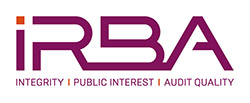Early adopters on the JSE drive MAFR up to 43%
|
Johannesburg, Sunday, March 7, 2021 – With just more than two years remaining until the effective date of Mandatory Audit Firm Rotation (MAFR) (1 April 2023), 43% of the JSE Ltd main board listed companies have already voluntarily rotated auditors since the Independent Regulatory Board for Auditors (IRBA) started tracking audit firm rotations in January 2017. This is up from 21% as reported in October 2019. Of the total number of rotations that have taken place since January 2017, 40% of companies cite compliance to MAFR as the reason for appointing new auditors. The second most cited reason was a tender process at 15%. Two of the country’s top four banks – Nedbank and ABSA - have completed at least one rotation of auditor. Banks are required to have joint auditors and there remains sufficient time before 2023 for these banks to rotate their second auditor. The JSE Ltd was the first to rotate citing MAFR. Other notable early adopters of MAFR are AECI Ltd, Telkom SOC Ltd, Anglo American, Bidvest, Afrox, MTN, Murray and Roberts, Impala Plats, MMI, Barloworld, PSG Group and Adcock Ingram. Says Imre Nagy, Acting CEO of IRBA: “For the remaining companies on the main board, those whose audit firms will have tenure of ten years or more at 1 April 2023 must rotate prior to that date. However, based on the encouraging voluntary early adoption by the clients of audit firms, the IRBA believes that there will be a significant number of rotations in the next two years and that by 2023 only a handful of listed entities will be impacted by the effective date of the rule. We are confident that MAFR is showing success, even on large and complex entities.” Four companies cited the United Kingdom’s requirement for mandatory tendering every 10 years as the reason for their rotation. This is as a result of the UK and other jurisdictions such as the European Union member states also believing that there are benefits to shorter tenure periods and prescribing strict audit firm tenure rules in those countries. One of the reasons why the implementation date was set at April 2023 was to provide audit firms and their clients with sufficient opportunity to prepare for MAFR and allow for cooling off from other work - as required by the Companies Act - to ensure that there would be firms eligible to appoint. Says Nagy: “What is particularly notable is that we have seen three companies appointing a big four firm together with a black-owned next tier firm in a joint audit arrangement. This will help to expose these smaller audit firms to large listed audits and transfer skills. During 2020, the IRBA also published a Guide to Joint Audits and we will continue to encourage this access to market to address transformation imperatives.” Concerns previously voiced that the big four will only rotate amongst each other has been disproved as a number of next tier firms have also benefited from rotation with BDO, Crowe Thawt, Mazars, Moore Stephens, Nexia SAB&T, Ngubane and Co, RSM, SNG GT, and PKF all picking up new audit clients on the back of rotation. Ends Notes to Editor: Accuracy of reporting may be compromised where companies did not issue a change of auditor notice, but merely included this in their annual financial statements. If there is any difference to the statistics it is likely to be aa larger number due to undetected rotations. 40% of entities which changed their audit firm cited MAFR compliance
The IRBA is a public protection statutory body established to protect the financial interests of the public by ensuring registered auditors and their firms deliver services of the highest quality. It upholds audit firm independence to ensure that audit quality is such that it enhances the accuracy and credibility of financial performance reporting. In this way, the IRBA has an important role to play in building the reputation of South Africa as an investment market for both local and global investors and driving economic growth for the country. The IRBA also registers suitably qualified accountants as auditors, who must adhere to the highest ethics standards, and promotes the auditing profession through the effective regulation of assurance conducted in accordance with internationally recognised standards and processes.
|





